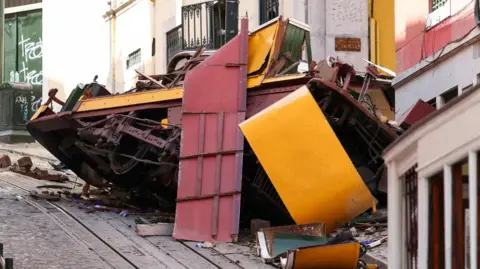Portugal is in mourning after 16 people died and a further 23 were injured when Lisbon's famous Glória funicular cable railway derailed on Wednesday evening.
Portuguese Prime Minister Luís Montenegro told a news conference on Thursday the number was revised down after emergency services earlier had put the toll at 17.
Among the dead were seven men and eight women, Margarida Castro Martins, head of Lisbon's Civil Protection Agency, said.
Five of those killed were Portuguese, while three Britons, two South Koreans, two Canadians, an American, a Ukrainian, a Swiss and a French national were also among the dead, police said.
Police have not yet confirmed the identities of those who died, but some have been named elsewhere. Here is what we know about them.
André Jorge Gonçalves Marques
Mr. Marques, who worked as the brake guard on the funicular, was among the dead, Portuguese transport union Sitra said.
We send our condolences to the families and friends of the victims of the accident and wish them a speedy recovery as well as the best recovery to the others injured in the accident, the union wrote on Facebook.
He was a dedicated, kind and happy professional, always willing to contribute to the greater good, according to his employer Carris, which runs the funicular.
Vladimiro Santos, a childhood friend of Mr. Marques, told the Portuguese newspaper Correio da Manhã that he grew up in the village of Sarnadas de São Simão in central Portugal and moved to Lisbon as a young man.
Mr. Marques leaves behind a wife and two children, the newspaper reported.
Pedro Manuel Alves Trindade
The former volleyball referee has been named as another victim of the crash by the Portuguese Volleyball Federation, which said it was deeply saddened by the tragedy.
It added that Mr. Trindade had served as leader of the Lisbon Volleyball Association as well as being a referee for it.
He worked for the Santa Casa da Misericórdia organization. The charity, which is the largest in Portugal, said four of its employees had died in the crash, but did not name them. Two others remained in hospital as of Friday.
Mr. Trindade also worked in the village of Estoril, roughly 24km from Lisbon, as a guest professor at a higher education institute specializing in hospitality and tourism.
What else do we know?
Three other workers at Santa Casa da Misericórdia were also killed and have been named in Portuguese media.
Alda Matias worked at the Strategic Planning Department alongside Mr. Trindade; Sandra Coelho worked in the cultural department; and Ana Paula Lopez was linked to childhood and youth projects, their colleagues have told the BBC.
In a statement to employees, Paulo Sousa, ombudsman for Santa Casa da Misericórdia said: It is in shock that we all find ourselves. We lost colleagues, friends, people with whom we shared our daily lives and our mission.
One employee, Valdemar Bastos, told the BBC that staff often used the funicular, along with tourists and elderly people, rather than walking up the steep hill.
A German family-of-three were also on board the funicular when it crashed, local media reported.
The UK Foreign Office said it was supporting the families of the three British nationals who have died and were in contact with the local authorities.
The Ukrainian Foreign Ministry has confirmed to the BBC that one of those killed in the Lisbon funicular crash is a 54-year-old Ukrainian man.
France's foreign ministry expressed its great sadness following the death of a French woman.
The incident highlights the critical role the Glória funicular plays for both locals and tourists in navigating Lisbon’s hilly terrain, and investigations are ongoing to ascertain how such a tragedy could occur.






















